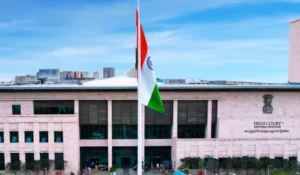Table of Contents
The Indian Bank is going to conduct the Indian Bank Local Bank Officer Exam 2024 for recruiting candidates for Local Bank Officer posts. For a planned preparation strategy, the aspirants must have a thorough awareness of the Indian Bank Local Bank Syllabus and the topics of each subject. Understanding the Indian Bank Local Bank Officer Syllabus 2024 and Exam Pattern helps candidates crack the examination easily.
Indian Bank Local Bank Officer Bank Syllabus 2024
Indian Bank has released the Indian Bank Local Bank Officer Recruitment 2024 announcing 300 vacancies for the recruitment of Local Bank Officers posts in Tamil Nadu / Puducherry, Karnataka, Andhra Pradesh &Telangana, Maharashtra, and Gujarat. In this competitive era, knowing the Indian Bank Syllabus 2024 is important for good preparation, and knowledge of question distribution and marking schemes will help you plan your preparation strategy for the Indian Bank Exam. Candidates who are going to take the Indian Bank LBO Exam 2024 should start preparing with full dedication.
Indian Bank LBO Syllabus 2024 and Exam Pattern
The Indian Bank Local Bank Officer Syllabus 2024 consists of four subjects: Reasoning & Computer Aptitude, General/Economy/Banking Awareness, English Language, and Data Interpretation. The written exam has 155 questions total of 200 marks. To qualify for the next stages, it is important to score well in all subjects. Here you can check the Indian Bank Local Bank Officer overview below in the table:
| Indian Bank LBO Syllabus 2024 and Exam Pattern | |
| Name of the organization | Indian Bank |
| Posts Name | Local Bank Officer (LBO) |
| Total Subjects |
|
| Indian Bank Local Bank Exam Date 2024 | 10th October 2024 |
| Total Questions | 155 |
| Total Marks | 200 |
| Selection Process | Shortlisting of applications followed by interview Or Online test(80%) + Interview(20%) |
| Minimum Qualifying marks | 40% for UR/EWS and 35% for others |
| Job Location | Andhra Pradesh, Tamil Nadu, Karnataka, Maharashtra & Gujarat |
| Official Website | https://www.indianbank.in/ |
Indian Bank Local Bank Officer Bank Selection Process 2024
The selection of candidates for Local Bank Officer posts is based on written / online exams and Interviews. The number of candidates invited for an interview will be 3 times the number of vacancies for the unreserved category and 5 times the number of vacancies for the reserved category. For Unreserved/ EWS the candidates need to score at least 40% in both the online test and the interview and at least 35% if they belong to SC/ST/OBC/PWBD categories.
- If the selection process includes both a test and an interview, the online test will count for 80% of the total score, and the interview will count for 20%. Wherever selection is by shortlisting of applications followed by an interview the weightage will be 100 % of the Interview Score.
- If two or more candidates get the same score in the test or interview, their rank will be decided based on their date of birth. The older candidate will be placed higher than the younger candidate.
Indian Bank Local Bank Exam Pattern 2024
The Indian Bank Local Bank Officer Exam 2024 will have Objective-type questions. There will be 155 questions. For each incorrect attempt, 1/4 of a mark will be subtracted.
| Subjects | No of Questions | Maximum Marks | Time Duration |
| Reasoning & Computer Aptitude | 45 | 60 | 60 minutes |
| General/ Economy/ Banking Awareness | 40 | 40 | 35 minutes |
| English Language | 35 | 40 | 40 minutes |
| Data Analysis & Interpretation | 35 | 60 | 45 minutes |
| Total | 155 | 200 | 180 minutes |
Indian Bank Local Bank Syllabus 2024
Candidates should practice with the latest Indian Bank LBO Syllabus 2024 to mark the important and weak topics. The Indian Bank Syllabus 2024 for Local Bank Officer posts will help you plan your studies for effective preparation. Here, we provide you with the updated exam syllabus.
Reasoning and Computer Aptitude
Reasoning checks the candidate’s logical and mental skills and the computer section assesses the person’s ability to effectively use computer software and hardware and basic computer skills like MS Office, surfing, browsing, etc. This part of the examination is considered easiest and scoring. This section has a weightage of 60 marks.
- Analogy
- Syllogism
- Coded equations
- Classification
- Blood Relation
- Direction questions
- Arithmetic Reasoning
- Venn Diagram
- Visual Reasoning
- Paper folding; unfolding questions
- Alphabet test
- Data Sufficiency
- Logical Reasoning,
- Statement
- Assumption
- Passage
- Inference
- Conclusion and Argument
- Networking
- Input-output devices
- DBMS
- MS Office
- History of computers & generations
- Shortcuts
- Internet
- Basic Hardware and Software
General/ Banking/ Economy/ Awareness
In the General Awareness section, you need to cover a variety of topics such as History, Polity, Current Affairs, Banking & Economy Awareness. This section is often seen as the most difficult part of the exam containing 60 marks, so it is important to go through the syllabus carefully and practice accordingly.
- Important Days
- Science
- India and its neighboring countries especially History, Culture, Geography, Economic Scene, General Policy & Scientific Research, People in News, Sports,
- Static GK,
- Important Schemes
- Portfolio
- Books and Authors
- Current Affairs
- Financial and Banking Awareness
Data Analysis and Interpretation
This section measures the candidate’s data analytics skills. To be proficient in this area, candidates need to have a solid catch on the fundamental mathematical concepts and have 60 marks.
- Line Charts
- Pie Charts
- Bar Graphs
- Radar Graphs
- Tables
- Mixed Graphs, etc
English Language
In the English Language section, candidates have to be proficient in grammatical skills, vocabulary section and especially comprehension. This subject is scored and contains 40 marks.
- Reading Comprehension
- Idioms, and Phrases
- One-word Substitution
- Sentence Correction
- Active Passive
- Spellings Correction
- Fill in the Blanks
- Sentence Rearrangement
- Synonyms-Antonyms
- Cloze Test
- Sentence Improvement
- Error Spotting





 JCI Syllabus 2025 for Junior Assistant, ...
JCI Syllabus 2025 for Junior Assistant, ...
 Bihar BSSC DST Office Attendant Syllabus...
Bihar BSSC DST Office Attendant Syllabus...
 AP High Court Syllabus 2025 (ఏపీ �...
AP High Court Syllabus 2025 (ఏపీ �...


